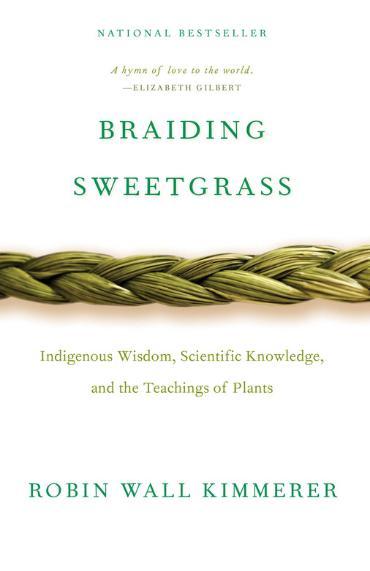
The Common Text
The Common Text Program
Each year the university selects a text or texts to launch the academic year for incoming students. At Seattle University, a key part of our mission is “empowering leaders for a just and humane world.” The Common Text program welcomes students to our Ignatian-inspired process of inquiry that emphasizes meaning-making, intellectual risk-taking, and engaging in deep and critical conversations.
Incoming students receive the year’s Common Text at orientation and are asked to read thoughtfully over the course of the year. Several first-year courses will include the text, and the book and its themes will be pursued in a year-long series of programs built around the themes.
This website introduces this year’s Common Text and provides resources to help you engage with the text as you read and prepare for the year. We will continue to add materials to the site, so check back regularly and be on the lookout for emails from the Common Text team with details on this year’s events.
Welcome to Seattle University, where we wrestle with big ideas!
Common Text 2023

We look forward to engaging with Braiding Sweetgrass by Robin Wall Kimmerer as a university community in 2023-2024. The book is a collection of short and readable essays reflecting on plants and animals as our oldest teachers; it addresses contemporary threats to the environment and ways of knowing that date back millennia and provides guidance on how to adopt an indigenous as well as a scientific framework. This year, it will fuel conversations on our campus about environmental justice, working toward a sustainable future, education, and indigenous ways of knowing.
Robin Wall Kimmerer is a mother, scientist, decorated professor, and enrolled member of the Citizen Potawatomi Nation. She is the author of Braiding Sweetgrass: Indigenous Wisdom, Scientific Knowledge and the Teachings of Plants and Gathering Moss: A Natural and Cultural History of Mosses. She lives in Syracuse, New York, where she is a SUNY Distinguished Teaching Professor of Environmental Biology, and the founder and director of the Center for Native Peoples and the Environment. Learn more about Dr. Kimmerer on her website.
Through the resources below, we invite you to get to know Braiding Sweetgrass
and take a deeper dive into the issues raised by Dr. Kimmerer’s book. We hope that this text and our accompanying materials offer new perspectives, prompt conversations, and perhaps even inspire action. Please take the time to read, listen, and watch. Then look for Common Text and partner events throughout the year that will provide you with multiple ways to engage these ideas.
Introductory Resources
Please begin by reading and viewing the following brief resources.
Note: Please click on "+" to expand, then click on "Access Articles Here" link to access the articles in their external pages.
Introductory Resources 2022
-
1. "Questions for a Resilient Future"
-
We invite you to listen to a talk Dr. Kimmerer gave titled “Questions for a Resilient Future” for the Center for Humans and Nature and the American Museum of Natural History’s Center for Biodiversity and Conservation:
-
2. The "Question of our Time"
-
Listen to Seattle University’s Dr. Christina Roberts in conversation with Dr. Kimmerer talking about “the question of our time” on KUOW.
https://www.kuow.org/stories/a-native-american-scientist-on-the-question-of-our-time
-
3. Indigenous Peoples of the Pacific Northwest
-
We respectfully acknowledge that Seattle University resides on the homelands of the Coast Salish peoples, who continue to steward these lands and waters as they have since time immemorial. We pay respect to Coast Salish Elders past and present and extend that respect to their descendants and to all Indigenous people. We recognize tribal nations and organizations who actively create, shape, and contribute to our thriving community at Seattle University and beyond.
Seattle University’s Indigenous People’s Institute has a great collection of local Indigenous resources and spaces: https://www.seattleu.edu/indigenous-peoples-institute/resources/
When you arrive on campus this fall, we invite you to visit some of the museums and cultural centers that focus on Indigenous Peoples.
Burke Museum of Natural History and Culture:
Daybreak Star Indian Cultural Center: https://www.burkemuseum.org/
Duwamish Longhouse and Cultural Center: https://unitedindians.org/daybreak-star-center/
And on campus, we hope you will visit the Taqwsheblu Vi Hilbert Ethnobotanical Garden: https://www.seattleu.edu/indigenous-peoples-institute/taqwsheblu-vi-hilbert-ethnobotanical-garden/
Campus Resources
- The Indigenous Peoples Institute: https://www.seattleu.edu/indigenous-peoples-institute/
- The Taqwsheblu Vi Hilbert Ethnobotanical Garden: https://www.seattleu.edu/indigenous-peoples-institute/taqwsheblu-vi-hilbert-ethnobotanical-garden/
- The Center for Indian Law and Policy housed in Seattle University’s Law School: https://law.seattleu.edu/centers-and-institutes/center-for-indian-law-and-policy
-
The Lemieux Library offers a number of resources and our dedicated library faculty can help you pursue your research interests: https://www.seattleu.edu/library/ Specifically, here's the library's resources on Indigenous Peoples: https://library.seattleu.edu/friendly.php?s=indigenousstudies
-
The Office of Diversity and Inclusion publishes annual Summer Reading lists and offers Red Talks throughout the academic year which can be accessed here: https://www.seattleu.edu/diversity/
- The University Core Office has a limited number of copies of 2019’s Common Text, So You Want to Talk About Race by Ijeoma Oluo, available for pickup on campus this Fall. Contact core@seattleu.edu if you are interested in receiving a copy!